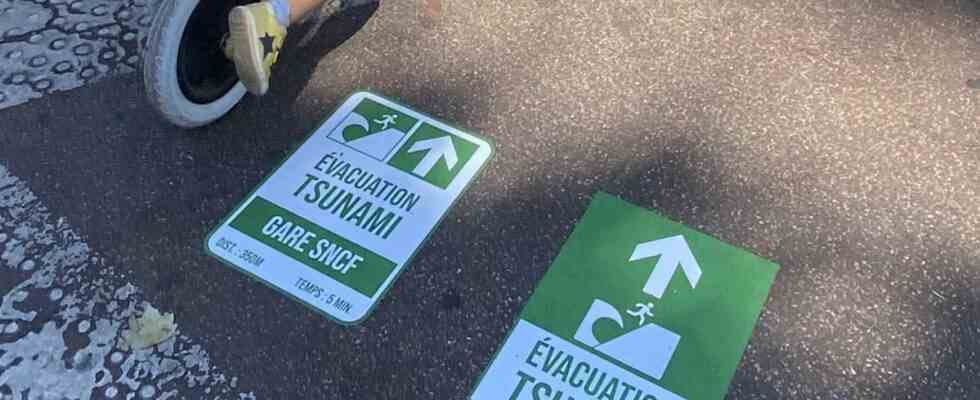Alert triggered at Nice airport. On Monday, the Riviera platform and its tracks built on the sea were under the threat of a major tsunami. In any case, this is the scenario that the Alpes-Maritimes prefecture had chosen to unfold during a “crisis management exercise”. At the end of the day, she explained in a press release that she had organized it to “test the response mechanisms to this risk” by involving “coastal communities”. Are they prepared enough? Chance (or not) of the calendar, Unesco launched the next day a cry of alarm on the lack of training of “populations at risk”, on the Mediterranean coasts in particular.
The United Nations Educational, Scientific and Cultural Organization has announced the extension of its protection program against these devastating tidal waves, already active in certain regions of the Caribbean, the Pacific or the Indian Ocean, in all risk areas in the world by 2030, including the Côte d’Azur.
Precedents and a “very high” probability in the next thirty years
Because the threat is real. She has already knocked. On February 23, 1887 in particular, after an earthquake that killed 644 people between France and Italy. More recently, on October 16, 1979, a wave caused by land subsidence on a construction site south of Nice airport killed eleven people. According to the most extreme models tested by the Geoazur laboratory, in the event of “total rupture of the Ligurian fault” with “an earthquake with a magnitude of 7.5”, the breakers could even “reach 4 m in Menton and on the capes, especially in Antibes”, explained, in 2019 to 20 minutes, scientist Laurie Boschetti. The balance would then be in other proportions.
This disaster scenario still seems “very implausible”, according to the specialist. On the other hand, “the probability of a wave of one meter, therefore catastrophic, in the next thirty years is very high there”, noted Tuesday Vladimir Ryabinin, executive secretary of the Intergovernmental Oceanographic Commission of Unesco. “Several seafronts, in Cannes, Golfe-Juan, Antibes and Menton” would be particularly affected, according to the prefecture of the Alpes-Maritimes, with water “penetrating into the land for several hundred meters”.
Signage to “refuge” points in the event of an alert
So is the Côte d’Azur ready to face it? Exercises are organized “every month in the Alpes-Maritimes”, explain the state services. They involve “the prefecture, the southern zone, the departmental fire and rescue operational center, as well as the municipalities once a quarter”. Cannes is the best pupil. Cited as an example by the UN, in the same way as Alexandria or Istanbul, the city of festivals would be the most advanced on the subject. In 2017, it was “the first city in France to organize a simulation exercise as part of its municipal safeguard plan (PCS)”, explained the municipality. More recently, in 2020, the latter began installing signage to coordinate evacuations. By indicating the points, high up or at a good distance from the coast, to be reached in the event of an alert.
Antibes, which has the longest coastline of all the towns in the Alpes-Maritimes department (23 km), follows suit. “This risk was already integrated into our long-standing municipal safeguard plan, but it is true that there has been an awareness to go further recently, explains the deputy mayor for Civil Security Marika Roman. . The prefect seized us last year and we now have 31 signs installed to mark the emergency routes. “The beach attendants are also sensitized as are the children in the schools “since they are powerful vectors for the parents”, advances the elected official.
Manage the alert and evacuations “in just 15 to 20 minutes”
The city of Nice, where “the tsunami risk is low in view of the topography of the seabed”, with a “very steep continental shelf, unlike Cannes for example”, leads the same policy in schools. She specifies that “documentation in French and English”, also for the tourist population, has also been produced. The community indicates that a “seismic metropolitan plan”, requested by the prefect in 2019, was “delayed” by the health crisis and by storm Alex but that its “launch” is now “in preparation”.
And for the alert? The National Tsunami Warning Center (CENALT) has been active since 2012. It is responsible for transmitting information to the authorities. And we would have to go quickly: “A tsunami generated by an earthquake in the Ligurian Sea would affect the Alpes-Maritimes in just 15 to 20 minutes”, describes the prefecture. ” Mermaids [du Système d’alerte et d’information aux populations] can be triggered, recalls Marika Roman in Antibes. We have also set up a server where people are invited to register to receive SMS and automatic calls in case of danger. Similar systems are available in several other cities, which also rely on variable message signs and social media to warn their residents.
On the night of March 18, 2021, this process was almost activated on the Côte d’Azur. A “yellow tsunami alert”, generated following a magnitude 6 earthquake on the other side of the Mediterranean, in Algeria, was finally lifted a few hours later without causing any damage on the Riviera side. In Cannes, the services of the town hall had followed this episode very closely and were already ready to react.

